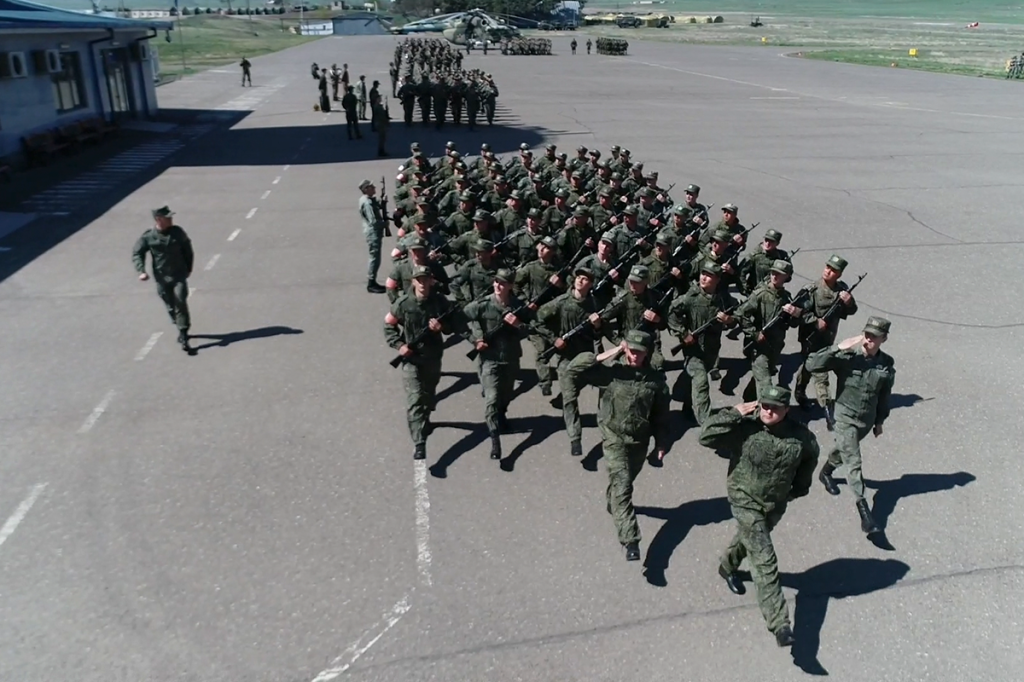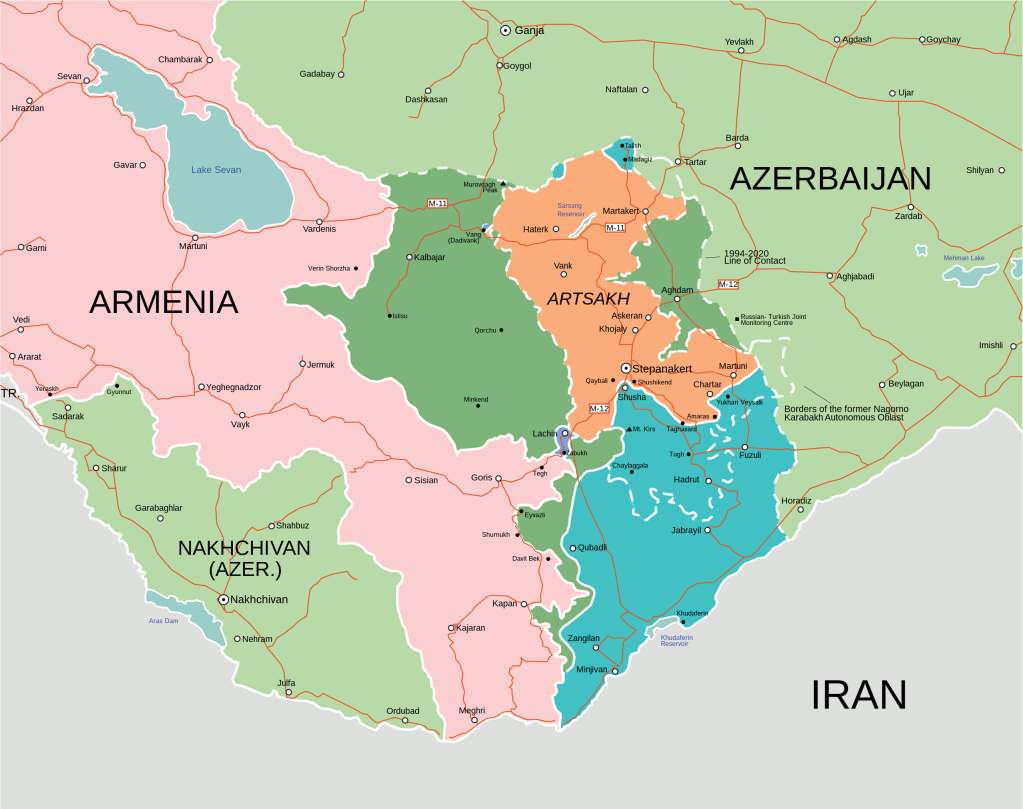
On September 20th, forces of the Republic of Artsakh capitulated to the Azerbaijani military, after twenty-three hours of shelling and advancement. With almost two-fifths of Artsakh’s forces destroyed within a day, hundreds of thousands are under threat of displacement, with Armenians joining fleeing Russians in Stepanakert’s airport as Azeri forces close in. From the international community, upon which Turkish interests and Azeri oil have a geopolitical headlock, only weak condemnation of Azerbaijan and empty platitudes are offered to the Armenian people.
Today, crimes by the Azerbaijani military against Armenian civilians have been reported in high numbers. Lack of electricity and internet access has made verification impossible, but reports of rape, murder, and the arrest of all males over the age of 14 in certain districts have reached the outside world.
The origins of the struggle over Nagorno-Karabakh are bitter and conflicting. The territory had been awarded to Azerbaijan in 1921, the conflict being one of the many legacies of the Soviet Union. For decades, Armenian efforts and petitions to reclaim the territory by popular vote went unheard by the Russian regime.
In 1994, Armenia seized the territory of Nagorno-Karabakh, an ethnic Armenian-majority region with a significant Azeri minority. The Armenians proceeded to displace hundreds of thousands of Azerbaijani citizens, with war crimes and atrocities attributed to both sides at the time.
Since, the Republic of Artsakh, carved out of territories seized by Armenia, was in de-facto control of the region, until a brief war in 2020 ended with Azerbaijan seizing back territory and encircling Artsakh. Azerbaijan’s military pioneered the same heavy artillery and drone-centric warfare that can be seen in the current War in Ukraine.
Over the 21st Century, Armenia developed into a flawed democracy, with rampant Russian interference across virtually all levels of society. Much like Ukraine before the Revolution of Dignity, Armenia was roped into the resurgent russkiy mir, under the false impression that sacrificing their international autonomy, their regional interests would be protected.
Azerbaijan, on the contrary, has become a ‘little Russia’ of it’s own. A rentier-state dictatorship, Azerbaijan’s leader, Ilham Aliyev, is an uncontested despot—his Vice President, appointed by himself, is his own wife. Sham elections and brutal suppressions of political dissidents form much of the history of Azerbaijan, but by virtue of its close cultural ties with Turkey, it has enjoyed a flexible foreign policy despite its internal politics mirroring those of any pariah state. Any act of perceived or real aggression, whether economic or military against Azerbaijan would provoke the harsh ire of Turkey—a nation neither Russia nor the West is ready to alienate.

Since 2020, Artsakh’s only connection with Armenia has been the Lachin corridor, where Russian peacekeepers were, in practice, assigned to ensure the transit of humanitarian goods.
Since March of 2022, the ability of Russia’s conventional military to project power over its borders was destroyed. As a result, Russia’s influence over the region has weakened, and many peacekeeping troops were transferred to Ukraine—leaving the Lachin corridor vulnerable.
Nine months ago, Azerbaijan imposed a blockade on the territories of Artsakh, closing the road crossings through the Lachin corridor. This began a long siege of the people in Artsakh, through starvation and sporadic skirmishes.

On September 19th, Azerbaijan attacked the defensive positions of the Artsakh Defense Army. Azerbaijan’s use of Israeli missiles and overwhelming artillery fire overwhelmed Artsakh’s forces, and neither the Armenian or Russian government intervened—with Armenia declaring that no Armenian forces were present inside the exclave, while Russia’s peacekeepers, after being shelled, retreated to Stepanakert’s airport.
Shortly after the collapse of Artsakh’s frontlines and the reportedly unhindered advance of Azerbaijani forces, the armed forces of Artsakh capitulated. Though Russia has claimed to be working as an intermediary in the coming peace talks, their relatively weak position in the region and Azerbaijan’s ultimatums as to the future of Artsakh indicate that the surrender of Artsakh is unconditional.

Throughout the air and land assault on Artsakh, the blockade on the Lachin corridor was lifted. This has led to thousands of ethnic Armenians fleeing from the exclave, and as Azerbaijani declarations begin to clamp down on any hopes of an Armenian negotiating position, it is likely that the Azeri strategy will focus on making life in Nagorno-Karabakh unbearable for Armenian citizens, to funnel them out through the Lachin corridor and into Armenia. These actions, as previously defined by a UN Commission, constitute ethnic cleansing and genocide.
The Failure of CSTO and Betrayal of Armenia

Predictably, the Russian Federation knifed Armenia. Under the Collective Security Treaty Organization (CSTO), Russia would have been obligated to defend Armenia’s territory, but refused to do so even under its negotiated obligations as peacekeepers. Some may argue that the lack of Russian response may be caused by the failure of their armed forces in Ukraine, but Russia’s betrayal also took place in 2020, when Azerbaijan attacked Armenia proper as well.
But most damningly, a meeting between Ilham Aliyev and Vladimir Putin took place on the eve of the Russian invasion of Ukraine, when, presumably convinced of Russia’s swift takeover of Kyiv, Putin and Aliyev ‘rose the relations of their two nations to the status of an alliance’.
Since the Russian blunder in Ukraine, Azerbaijan has funded military equipment to Ukraine a stance which has shielded them from condemnation for their actions in Armenia. As Armenia remains a Russian ally in name, many pro-Ukrainian activists consider Armenia complicit, and even cheer on Azerbaijan’s liberation of their internationally recognized territory.
However, Azerbaijan’s actions could not be further from Ukraine’s, who until February 24th, 2022, had no intention of forcing the liberation of Donetsk, Luhansk, and Crimea through military means. Under every Ukrainian government since 2014, Ukraine has been committed to dialogue and resolution through international mediation, an opportunity which Russia ultimately rejected. Ukraine’s military efforts to reclaim Crimea can never be construed as those of an aggressor, whereas Azerbaijan launched large-scale invasions on Armenian occupied territory twice within the current decade.
Armenia’s Pivot West

Under administration of Nikol Pashinyan, Armenia has broken rapidly from the Russian sphere of influence, seeking to align itself with Western powers to safeguard its interests. To a degree, Armenia’s shift has met mild success—American troops were in Armenia on the day of the invasion, in a joint-training exercise. The State Department has repeatedly condemned Azerbaijan’s invasion, and the Armenian lobby in the United States has held massive sway on public opinion at home.
Azerbaijan’s alliance with Turkey makes any prospects of aid or even sanctions dim—as a strategic member of the NATO alliance, Turkey’s red line on Azeri-Armenian relations are clear to all. The EU’s decision to pump Azerbaijani gas to offset the loss of Russian energy has also complicated matters, and drawn claims of hypocrisy over their staunch support for Ukraine.
Two other major players also upset Armenia’s diplomatic efforts—Israel and Iran. Israel, a supporter of Azerbaijan, has supplied Aliyev’s armies with advanced drones and missilry—even after refusing to do the same for Ukraine for over a year of war.

Armenia’s only ally, moreso a partner of opportunity, is Iran. Azerbaijan and Iran are geopolitical rivals, and Azerbaijan’s Nakhchivan province borders Turkey. If Azerbaijan were to close the Zangezur corridor between its continuous territory and its exclave, it would have a direct border with Turkey, a nightmare scenario for Iran’s national security.
While Iranian nationalists consider Azerbaijan a province of ‘Greater Persia’, any such attempts by the Islamic Republic would be catastrophic if the Turkish army could move itself into position. Many Azeris, in turn, consider parts of Iran which are predominantly Azerbaijani to be occupied by the theocratic regime.
As a result, the IRGC has vowed to intervene if Azerbaijan makes a play on the corridor, though with only Artsakh’s loss, the Islamic Republic has taken no actions to defend its partner.
Dim Prospects
Armenia’s future is incredibly bleak. CSTO is dead in all but name, whilst NATO is restricted by the EU’s energy needs and Turkey’s significance. Nothing stands in the way of Azerbaijan’s ethnic cleansing, which has seen long columns of Armenian citizens leaving the region through the Lachin corridor.
As a reminder, whilst holding Armenia accountable for the expulsion of Azeri minorities in the first Nagorno-Karabakh War, the region was majority Armenian then, and majority Armenian now. Nothing Azerbaijan’s government says or does will absolve the unspeakable crime of ethnic cleansing.
Had Armenia aligned itself more closely with the West in previous years, Azerbaijan may have been cowed into the use of diplomatic pressure—a negotiated settlement for the restoration of Azerbaijan’s international recognized territory could have been reached without the purging of the Armenian ethnic populace. Ultimately, Russia’s betrayal and subsequent weakness emboldened Azerbaijan’s dictator, and the subsequent military invasion has left Armenia with little room at the negotiating table.
For Artsakh, their role in the region is over, with little hope remaining for the thousands of Armenians stranded in the airport of Stepanakert. Now, the question remains as to whether Azerbaijan will strike next at Armenia proper, to close the Zangezur corridor and perhaps annex the friendless nation entirely.
For many Armenians, the question is not if, but when.
Make a one-time donation
Make a monthly donation
Make a yearly donation
Choose an amount
Or enter a custom amount
Your contribution is appreciated.
Your contribution is appreciated.
Your contribution is appreciated.
DonateDonate monthlyDonate yearly
You must be logged in to post a comment.